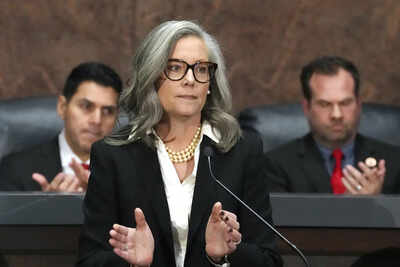Latest Education news – Board Exam Results, Admit Cards, Exam Paper Analysis and Question Papers | Times of India
An explosive political clash has reignited in Arizona, where education, free speech, and civil liberties have collided in the form of a vetoed bill that sought to outlaw the teaching or promotion of antisemitism in public schools and universities. At the heart of the storm is Governor Katie Hobbs’ decision to strike down a proposal that would have imposed sweeping legal and professional penalties on educators, stirring fierce reactions from both proponents and critics of the legislation.What appeared on paper as a firm stance against antisemitism was, according to Hobbs and many education advocates, a veiled threat to the very core of academic freedom. By introducing punitive measures that held teachers personally liable for how classroom content might be interpreted, the bill threatened to turn lesson plans into legal minefields. The governor’s veto has now opened up a broader national debate: Can efforts to combat hatred go too far, to the point of silencing those they claim to protect?
A proposal rooted in legal penalties and content restrictions
The bill, passed narrowly in the Arizona House with a 33-20 vote and modest Democratic support, proposed a sweeping prohibition on teaching or promoting antisemitic content within public K-12 schools, community colleges, and universities. It extended to any teaching that could create a “hostile environment,” including calling for genocide or compelling students to defend antisemitic viewpoints.The legislation mandated that educators found in violation of these rules could face direct legal action. Teachers would not only risk professional discipline but could be held personally responsible for covering financial damages awarded in lawsuits, with no state immunity or financial backing.
Governor Hobbs pushes back
Governor Hobbs, a Democrat, swiftly denounced the bill, calling it a legislative attack on the state’s educators rather than a genuine attempt to fight antisemitism. “It puts an unacceptable level of personal liability in place for our public school, community college, and university educators and staff, opening them up to threats of personally costly lawsuits,” she stated. “Additionally, it sets a dangerous precedent that unfairly targets public school teachers while shielding private school staff.”While affirming that antisemitism remains a serious issue in the United States, Hobbs emphasised the importance of utilizing existing mechanisms like the Arizona State Board of Education to address complaints, rather than imposing punitive legislative overreach on teachers.
Critics warn of chilling effects on education
Opposition to the bill came not only from political quarters but also from scholars and educational advocates. Many argued that the vague language of the proposal risked misinterpretation and overreach, potentially criminalizing legitimate classroom discussions—especially those relating to the Holocaust, Middle Eastern history, or current geopolitical conflicts.
Layers of enforcement and escalating penalties
The bill laid out a tiered enforcement structure for violators. In K-12 settings, educators would receive a reprimand for a first offense, a certificate suspension for a second, and certificate revocation upon a third. For college and university staff, the repercussions included a reprimand, suspension without pay, and eventual termination.Moreover, the bill would have required institutions of higher learning to treat antisemitism violations as a negative factor in employment and tenure decisions. Student organizations, too, would fall under scrutiny; any group hosting a speaker who incited antisemitism or called for genocide could be denied official recognition.
Lawsuit provision draws intense scrutiny
One of the most contentious elements of the bill was the lawsuit provision. Students over 18 and parents of minors would be empowered to sue educators over perceived violations. Teachers found liable would have to pay damages out-of-pocket, with the state explicitly barred from covering such costs.Democrats attempted to amend the bill to replace references to “antisemitism” with “unlawful discrimination” to align the measure with broader civil rights language and reduce ambiguity, but the proposal was rejected.
Political fallout and national context
The bill’s sponsor, Republican Representative Michael Way of Queen Creek, condemned the veto as a betrayal of Jewish communities and educational integrity. Taking to social media, he labeled the decision as “disgraceful,” arguing the bill was intended to protect classrooms from “egregious and blatant antisemitic content.”Supporters of the bill viewed it as part of a growing national effort to counter antisemitism. Parallel initiatives are emerging in other states. In Louisiana, legislators are urging universities to adopt policies to monitor and address antisemitic incidents. Michigan lawmakers are moving to enshrine a formal definition of antisemitism into the state’s civil rights law.
A precedent with broad implications
Governor Hobbs’ veto may mark a pivotal moment in the evolving landscape of education policy, particularly at the intersection of free speech, academic integrity, and civil rights. It highlights the thin line policymakers must walk in addressing hate speech without infringing upon pedagogical freedom.At the heart of the matter lies a profound question: How can educational institutions confront antisemitism without undermining educators’ ability to teach complex, and often uncomfortable, truths?For now, Arizona’s public educators can breathe a sigh of relief, shielded from immediate legal vulnerability. But as similar bills emerge in other states, the national conversation around classroom speech, antisemitism, and educator liability is far from over.
#Arizona #governor #blocks #antisemitism #curriculum #ban #Defends #classroom #freedom #Times #India
